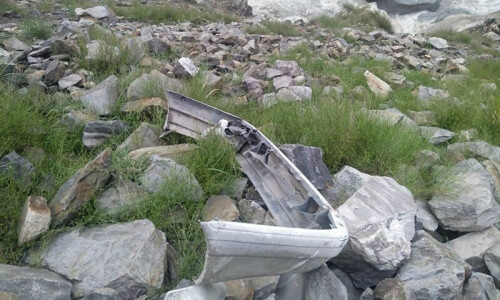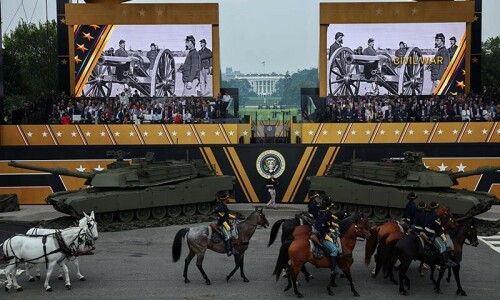• Officers to get 50pc of salary, soldiers 20pc; ministry stays mum on financial impact
• Minister expects policy rate to come down before next year, seems hopeful about privatisation
• Finance secretary says current year’s uplift budget reduced to Rs967bn, hints at further drop
• Lawmakers concerned over tax-to-GDP ratio, revenue shortfall, taxes on solar panels, among other things
ISLAMABAD: Amid a downward revision in federal development spending, which may fall further by the end of this month, the Ministry of Finance told a parliamentary panel on Thursday that armed forces officers had been granted a special relief allowance at 50 per cent of their basic salary, while junior commissioned officers and soldiers would get 20pc allowance in the upcoming fiscal year.
Testifying before the National Assembly’s Standing Committee on Finance and Revenue, Secretary Finance Imdadullah Bosal highlighted relief measures proposed in the budget, saying that “special relief allowance at the rate of 50pc to officers and 20pc to JCOs/soldiers” of their basic salary had been granted. The meeting was presided over by MNA Syed Naveed Qamar.
The ministry did not disclose the financial impact and the reason for the higher allowance for officers in response to members’ questions about the financial impact of these allowances. Finance Minister Muhammad Aurangzeb promised to get back with a detailed response, besides few other things, later saying he had noted down the points raised by Omar Ayub, the leader of the opposition.
Mr Bosal disclosed that the current year’s public sector development programme had been revised to Rs967bn from Rs1.1 trillion and conceded even this amount may not be fully utilised by June 30, given the fact that Rs662bn had so far been actually spent.
At this, the members pointed out that a reduction in development expenditure would not only change the current year’s growth estimates (2.7pc of GDP) based on Rs1.1tr investment but also many other economic indicators as well.
The minister expected the central bank’s policy rate decline to single digits before the close of the current calendar year, as inflation had been a ‘fantastic story’ and both fiscal and current accounts improved significantly. He said the monetary policy committee was set to meet next week and there was a cushion to do more. He did not comment further, saying it was the State Bank of Pakistan’s domain.
The minister said Pakistan would be receiving about $1bn foreign inflows before the close of the current fiscal year through a syndicated arrangement from banks, with about $500 million guarantee from the Asian Development Bank, to be doubled next year. Therefore, the foreign exchange reserves currently at over $11bn would touch $14bn by June-end.
The minister said Pakistan would double commercial and capital market borrowing next year as credit ratings improved further, pointing out that about $500 million foreign bond maturing in September and another $1.2bn in April next year would be repaid in time.
The finance secretary said the major source of non-tax revenue – SBP profit – that stood at Rs2.6tr during the current year and projected at Rs2.4tr next year was mainly because of windfall from the higher policy rate. Normally, it remains around Rs1tr or so, he said.
Petroleum levy
He said the petroleum levy, another major source of non-tax revenue, stood at Rs78 per litre on diesel and Rs77 per litre on petrol and would be increased by Rs2.5/litre carbon levy under the next year’s budget, taking its size on average to Rs80/litre on these two products.
With an additional levy on furnace oil, the PDL was targeted to generate Rs1.468tr next year from Rs1.161tr during the current year. He confirmed that the upper cap on the petroleum development levy had been removed as the government increased its rate by Rs10/litre for the power sector subsidy and another Rs8 per litre for the Quetta-Karachi (N25) highway. The government had no plan to further increase it, he added.
Mr Bosal said the BISP allocation for next year had been increased by 21pc to Rs716bn from Rs592bn, while Azad Kashmir’s grant had been jacked up by 33pc to Rs140bn next year from Rs105bn. The allocation for Gilgit-Baltistan had also been raised by 18pc to Rs80bn from Rs68bn, which was in addition to another Rs20bn wheat subsidy to the region. Likewise, another special area of tribal merged districts had also been increased by 21pc to Rs80bn from Rs66bn.
The minister acknowledged members’ concern about Rs87bn revenue projections next year from privatisation deals. He said this was an area where the government could not complete any transaction, but many corrections had been made, including certain incentives allowed by the IMF. This would not only take the PIA to the finish line but also the Roosevelt Hotel, three power distribution companies and a couple of financial sector transactions, both through strategic sale and listings on the capital market, he added.
The finance minister thanked the four provinces for delivering over Rs1tr cash surplus this year and hoped to secure another Rs1.464tr next year. Their support helped the overall fiscal deficit reach 5.6pc of GDP against the federal deficit of 6.8pc envisaged in the budget last year. With their support, the consolidated fiscal deficit was estimated at 3.9pc of GDP for next year.
The committee members expressed concerns over the tax-to-GDP ratio, revenue shortfall, taxes on solar panels, hybrid vehicles, carbon levy, petroleum levy, private sector lending and debt, SMEs, industrial and agricultural growth and targets, withholding tax (WHT) on ATMs and bank deposits, pensions, gender-specific allocations, health-specific allocations, electric vehicles, structural reforms, sales tax on cotton, public sector expenditure, defence spending, the widening current account deficit, and the negative growth rates observed in both the manufacturing and agricultural sectors.
The discussion also highlighted the challenges of climate change and the need for social protection. The members expressed serious concerns regarding the inefficiency of Customs Intelligence and smuggling at the borders.
Published in Dawn, June 13th, 2025











































